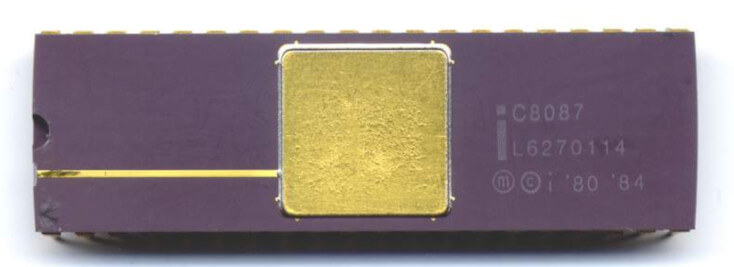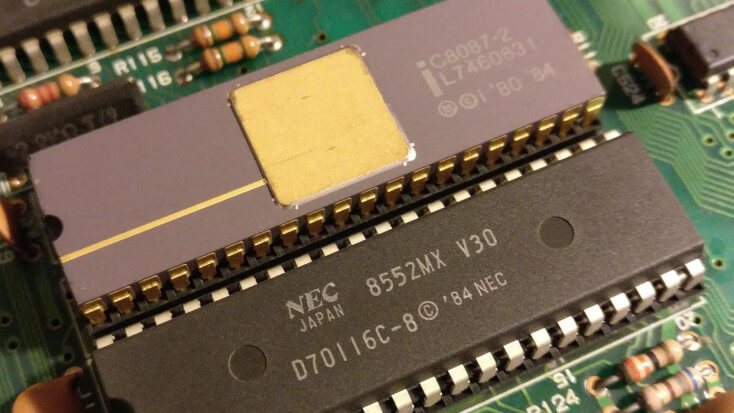Introduction To The Intel 8087
The Intel 8087 Co-Processor was released in 1980 and handles floating point operations, a type of mathematical operation that the CPUs of the time (such as the 8088 and 8086) couldn’t handle natively. The presence of a math co-processor (also known as an FPU or “Floating Point Unit”) could lead to significant performance benefits in software that was specifically designed with these chips in mind. Co-processors were eventually rendered redundant upon the release of the 486 “DX” variants, and later the Pentium CPU, which had an onboard FPU.
(Thanks to Anon for the correction regarding 386 DX CPUs, these don’t have an onboard FPU as per the 486 DX and require a 387 co-processor for this purpose).
My Amstrad PC1512 was fitted with an 8087 alongside its NEC V30 upgrade, and I have an IBM PC 5150 making its way to me soon which will also be receiving the same upgrade, so I decided to start compiling a list of such software.
Note that the 8087 won’t improve performance in any software which wasn’t specifically written for it. As these chips were rare and expensive at the time the overwhelming majority of software did not utilise them. Of course in this day and age 8087 chips are more readily available, so installing one might make sense even if you’re not running something from this list “just in case”. A better drop-in upgrade for overall performance would be the NEC V20/V30 CPU - depending on your opinions on “originality” of course, although as a period-correct upgrade I’m happy to use them.

The List
Note that this will be periodically updated as I come across more software. I am trying to verify where possible, however without source code available “verification” is often just a case of spotting multiple anecdotes in the wild. Note that only specific versions of this software may support the co-processor - I will try to add version numbers as I research more thoroughly. I will try to add links in due course.
Finally, also of note is the fact that, while usually optional, some software (such as IBM FORTRAN) will not run at all without a co-processor present.
- Arts&Letters (Design / Graphics / DTP) - Unverified
- AutoCAD (Design / Graphics / DTP)
- Begins (Gaming)
- CheckIt Diagnostics (System / Diagnostic)
- Combination Lock (Gaming)
- dBase IV (Database) - Unverified
- Falcon 3.0 Flight Simulator (Gaming)
- FoxBase (Database) - Unverified
- FRACTINT Fractal Generator (Science / Mathematics)
- Freedom of Press (Design / Graphics / DTP)
- Freelance (Design / Graphics / DTP)
- GenericCAD (Design / Graphics / DTP) - Unverified
- IBM FORTRAN (Development) (Required)
- IBM PC APL (Development) (Required)
- Landmark Benchmark (System / Diagnostic)
- Lotus 1-2-3 (Office / Productivity)
- Mathematica (Science / Mathematics) - Unverified
- MATLAB (Science / Mathematics)
- Microsoft Flight Simulator (Gaming)
- Microsoft Excel (Office / Productivity)
- Microsoft QuickBasic 4.5 (Development)
- Microsoft Windows (Operating System)
- Paradox (Database) - Unverified
- Pub Pool (Gaming)
- Scorched Earth (Gaming)
- Quattro Pro (Office / Productivity)
- Revelation (Database) - Unverified
- SimCity (Gaming)
- SPSS/PC (Science / Mathematics) - Unverified
- Statgraphics (Science / Mathematics) - Unverified
- Stunt Car Racer (Gaming) - Unverified
- SuperCalc (Office / Productivity)
- TKSolver (Science / Mathematics) - Unverified
- VersaCAD (Design / Graphics / DTP) - Unverified
- Wingz (Office / Productivity) - Unverified
- Zephyr Services LoadStar (Astronomy / Planetarium)
Sources (So Far)
- Software Which Can Use 8087 / 80287 Coprocessor (VCFed)
- Programs That Use The 8087 (VCFed)
- What Uses A 287 Co-Processor (VCFed)
- Mobygames
If you liked this post please consider following me on Instagram or BlueSky!


